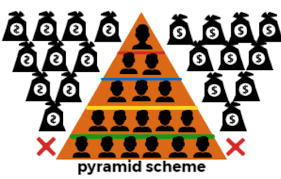Is Affiliate Marketing a Pyramid Scheme: Unveiling the Truth

Is Affiliate Marketing a Pyramid Scheme
Affiliate marketing is not a pyramid scheme. Let me clarify the distinction:
- Affiliate Marketing:
- In affiliate marketing, companies collaborate with partners or “affiliates” (such as influencers, bloggers, or website owners) to promote their products or services.
- Affiliates earn commissions based on sales generated through their promotional efforts.
- They do not pay anything upfront to promote the products.
- Affiliates choose which products to promote and receive compensation only when they successfully drive sales.
- The focus is on selling products, not recruiting others.
- Pyramid Schemes:
- Pyramid schemes are illegal because they promise profits primarily based on recruiting new members, rather than selling actual products or services.
- Participants in pyramid schemes earn money by recruiting more people into the scheme.
- Financial rewards are tied to recruitment, not product sales.
- Pyramid schemes lack a genuine product or service to offer; their structure relies solely on recruitment.
In summary, affiliate marketing is a legitimate business model where affiliates earn commissions by promoting valuable products or services. It is not a pyramid scheme. Remember, pyramid schemes are illegal because they prioritize recruitment over real investment or product sales. 🌟
Is Affiliate Marketing a Pyramid Scheme? Unveiling the Truth
No, affiliate marketing is not a pyramid scheme. While there may be some superficial similarities between the two, they are fundamentally different in nature and structure.
Affiliate marketing is a legitimate business model where individuals or companies earn a commission by promoting and selling products or services on behalf of another company. Affiliates earn a commission based on the sales or leads they generate through their marketing efforts. It operates on a performance-based model, rewarding affiliates for their successful referrals.
On the other hand, a pyramid scheme is an illegal and unsustainable business model that primarily focuses on recruiting participants and collecting fees from them. The emphasis is on recruiting new members rather than selling actual products or services. As the scheme relies on an ever-increasing number of participants to sustain itself, it eventually collapses, leaving the majority of participants at a loss.
Is Affiliate Marketing A Pyramid Scheme: Most Common Myths
Your statement accurately highlights the distinction between pyramid scams and affiliate marketing. Pyramid schemes lure individuals with false promises of high returns, while affiliate marketing is a legal and beneficial business model where merchants and affiliates mutually benefit from their marketing efforts.
- Many people mistakenly believe that affiliate marketing is a pyramid scheme, but that is incorrect. Participating in a pyramid scam is not acceptable.
- Pyramid schemes primarily focus on recruitment and lack the sale of actual products or services. The emphasis is on hiring others to join and contribute financially.
- In contrast, affiliate marketing involves selling real goods or services and earning commissions for successful sales or referrals. It is not a pyramid scheme.
- However, a common misconception about affiliate marketing is that it can lead to overnight wealth. Like any legitimate business, it requires effort, time, and strategic marketing to achieve success.
Differences Between Affiliate Marketing And Pyramid Schemes

is affiliate marketing a pyramid scheme
In this context, is affiliate marketing a pyramid scheme: Affiliate marketing and pyramid schemes are distinct business models. In affiliate marketing, individuals promote products/services and earn commissions from successful sales/leads. Pyramid schemes rely on recruitment, lack products/services, and collapse, causing financial losses. The key difference lies in legitimate product promotion and tangible transactions in affiliate marketing, while pyramid schemes focus on recruitment without genuine offerings. Understanding this distinction is vital to avoid fraudulent schemes.
- Focus on Products vs Recruitment: Affiliate marketing centers around promoting products or services, whereas pyramid schemes focus on recruitment without legitimate products.
- Legality: Affiliate marketing is legal and widely accepted as a legitimate business practice. Pyramid schemes, on the other hand, are illegal in most jurisdictions due to their fraudulent nature.
- Long-Term Viability: Affiliate marketing is a sustainable business model as it relies on the sale of actual products or services. Pyramid schemes are inherently unsustainable, leading to financial losses for the majority of participants.





